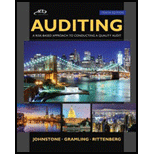
a
Introduction:
To ascertain:the procedure that the auditor should use to clear the exception
b
Introduction:Audit procedures are used to determine the quality of financial information by the auditors and finally they express their opinion.
To ascertain:the procedure that the auditor should use to clear the exception
c
Introduction:Audit procedures are used to determine the quality of financial information by the auditors and finally they express their opinion.
To ascertain:the procedure that the auditor should use to clear the exception
Trending nowThis is a popular solution!

Chapter 9 Solutions
Auditing: A Risk Based-Approach to Conducting a Quality Audit
- Which account is not closed at the end of an accounting period? Consider typical accounts maintained in the general ledger. (A) Sales (B) Wages Expense (C) Capital (D) Rent Revenuearrow_forwardPlease provide the correct answer to this general accounting problem using valid calculations.arrow_forwardWhat is the predetermined overhead rate it should use during the year?arrow_forward
- Delta Print Co. tracks its machine maintenance: • • 1. Highest activity: 15,000 units, $22,500 total cost Lowest activity: 5,000 units, $12,000 total cost Compute the variable cost per unit 2. Compute the fixed costarrow_forwardfinancial accountingarrow_forwardPlease provide the accurate answer to this general accounting problem using valid techniques.arrow_forward
- Please help me solve this general accounting question using the right accounting principles.arrow_forwardNova Inc. produced 20,000 units. • Standard usage = 3 lbs/unit at $4/lb Actual usage = 3.1 lbs/unit at $3.90/lb Calculate price and quantity variances.arrow_forwardKindly help me with this General accounting questions not use chart gpt please fast given solutionarrow_forward
 Auditing: A Risk Based-Approach (MindTap Course L...AccountingISBN:9781337619455Author:Karla M Johnstone, Audrey A. Gramling, Larry E. RittenbergPublisher:Cengage Learning
Auditing: A Risk Based-Approach (MindTap Course L...AccountingISBN:9781337619455Author:Karla M Johnstone, Audrey A. Gramling, Larry E. RittenbergPublisher:Cengage Learning Auditing: A Risk Based-Approach to Conducting a Q...AccountingISBN:9781305080577Author:Karla M Johnstone, Audrey A. Gramling, Larry E. RittenbergPublisher:South-Western College Pub
Auditing: A Risk Based-Approach to Conducting a Q...AccountingISBN:9781305080577Author:Karla M Johnstone, Audrey A. Gramling, Larry E. RittenbergPublisher:South-Western College Pub


